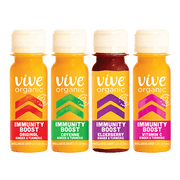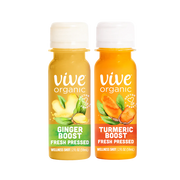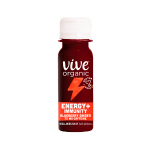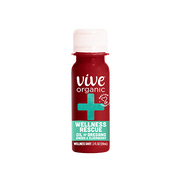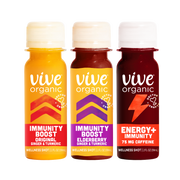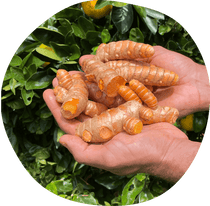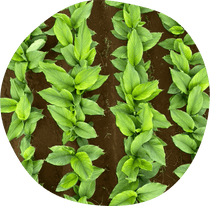If you're like most people, you probably run to avoid the sneeze or cough that you just heard around the corner. However, navigating the cold and flu season can be difficult. Despite our best efforts to support our immune system with a healthy diet and lifestyle, avoiding the common cold and its symptoms, such as a dry, scratchy throat, may prove impossible.
In this blog, we'll look at the potential benefits of ginger's naturally occurring anti-inflammatory and antimicrobial properties, as well as how ginger can be used as part of a holistic approach to managing sore throat symptoms.
Ginger — More Than a Common Herb
If you enjoy the spicy taste and warm sensation that ginger (Zinger officinale) brings to your table, you should know that this rhizome or ginger root may have some health benefits. Ginger is a well-known herb that has been used for centuries and is still one of the most commonly used herbs or dietary ingredients in the world.1 Ginger has also been used for a variety of homeopathic or medicinal purposes in Ayurvedic and Chinese medicine.
The use of natural plants and herbs, such as ginger, has increased exponentially over the years, and we have come to rely on ginger's natural bioactive components for potential anti-inflammatory, antimicrobial, and immune support.1, 2, 3
Let’s examine some of the naturally occurring substances that are found in ginger, such as some essential vitamins, minerals, and natural phytochemicals (plant compounds) that may confer health-promoting benefits for us.
Health Supporting Components in Ginger
Plant Phenols
First and foremost, you may already be familiar with plant phenols; however, a refresher is always helpful. Phenols or phenolic compounds are quite chemically complex, but all we need to know and appreciate is that these plant substances may help to protect us from the damage of chronic oxidative stress due to their high antioxidant content.2, 3, 4 Several studies have shown that ginger was effective for protection against oxidative stress.5
There are more than one hundred bioactive components found naturally in both fresh and dried ginger.2 The main classes of ginger compounds include phenols such as gingerols, shogaols, paradols, zingiberene, and zingerone, as well as other compounds, including vitamins and minerals.2, 5, 6
Gingerol is the primary phenolic compound that contributes not only to the spicy flavor of ginger but also to a variety of health benefits. Fresh ginger, also known as raw ginger, contains the majority of gingerol.6 Once fresh ginger is heated or sits in storage for a long period of time, there is a chemical change that takes place. The gingerols are converted to other phenols called shogaols. Both of these phenols are important and may provide immune system and anti-inflammatory support for us.
Ginger’s Potential Health Properties
Anti-Inflammatory
Due to the anti-inflammatory mechanisms that this herb may provide, studies continue to research ginger's role in preventing inflammation in the respiratory system.7 Some research studies have demonstrated that gingerol may slow down or even inhibit the production of inflammatory molecules in the body.5
Since ginger has some powerful anti-inflammatory properties, it may help to ease that uncomfortable feeling we experience when coping with symptoms of a common cold like that scratchy sore throat or cough.
Antimicrobial
According to several studies, ginger has some unique compounds that possess antimicrobial properties. Ginger and ginger extracts have demonstrated that these antimicrobial properties may help the immune system fight bacteria or viruses that cause infections, such as those that are associated with sore throats.8 According to several studies, ginger has some unique compounds that possess antimicrobial properties, more research is needed to confirm these findings in clinical settings.
Great Ways to Use Ginger in Your Diet
In addition to adding some fresh peeled ginger to a cup of warm tea with lemon to ease that sore throat or soothe that cough, you can also consider chewing a thinly sliced piece of fresh ginger to get that boost of gingerol and other healthy plant components.
You can also support your daily health and wellness by reaching for a potent shot of organic ginger like that found in Vive® Organic Ginger Boost wellness shot. This fresh, cold-pressed shot provides the benefits of ginger but is also a good source of vitamin C.
Think about it, adding ginger to a healthy diet that boasts of foods from all of the food groups is a win-win in supporting your immune system and overall health.
Safety
- All changes that you are looking to make to your diet should be discussed with your healthcare provider. Though ginger is a naturally occurring herb, it may not be suitable for all populations to use.
- According to the National Institute of Health (NIH), and National Center for Complementary and Integrative Health (NCCIH), some studies of the use of ginger during pregnancy may suggest it is safe, but the evidence is not conclusive.9 Little is known about whether it’s safe to use ginger while breastfeeding.9 Since there is not enough data to support the use of ginger during pregnancy or while breastfeeding, you should always consult your healthcare provider.9
- Individuals who are on medications or other dietary supplements should confer with their healthcare providers to determine if they are a candidate or not for using ginger or ginger supplements, since there are some potential food and medication interactions, as well as potential dietary supplement and medication interactions that may occur.
Key Takeaways
In conclusion, many bioactive compounds that are found naturally in ginger appear to have positive health effects. Continued scientific research is required before we can begin to make science-based dietary recommendations.3 Overall, we know that there is enough evidence to eat a varied diet that includes foods rich in phytochemicals or bioactive compounds.3
The bottom line is that eating enough vegetables, whole grains, fruits, legumes, and nuts is essential for maintaining our overall health and well-being. Adding fresh ginger to our tea, meals, or a power-packed organic shot like Vive® Organic Ginger Boost wellness shot may provide a real punch of phenolic compounds found in ginger, which may support our immunity and hopefully soothe that sore throat associated with the common cold or environmental irritation.
Disclaimer: This blog contains promotional content about our products. The information provided in this blog is for educational and informational purposes only and should not be construed as medical advice. While the nutritional information and health tips shared here are based on published studies and expert insights, they should not replace advice and treatment from a healthcare professional. Always consult a qualified healthcare provider with any questions you may have regarding a medical condition or health objectives.
Resources
- Surh, Y. “Molecular mechanisms of chemopreventive effects of selected dietary and medicinal phenolic substances.” Mutation research vol. 428,1-2 (1999): 305-27. doi:10.1016/s1383-5742(99)00057-5. https://pubmed.ncbi.nlm.nih.gov/10518003/
- Anh, Nguyen Hoang et al. “Ginger on Human Health: A Comprehensive Systematic Review of 109 Randomized Controlled Trials.” Nutrients vol. 12,1 157. 6 Jan. 2020, doi:10.3390/nu12010157. https://pmc.ncbi.nlm.nih.gov/articles/PMC7019938/
- Kris-Etherton, Penny M et al. “Bioactive compounds in foods: their role in the prevention of cardiovascular disease and cancer.” The American journal of medicine vol. 113 Suppl 9B (2002): 71S-88S. doi:10.1016/s0002-9343(01)0099. 5-0. https://pubmed.ncbi.nlm.nih.gov/12566142/
- N. Bandara, M. Chalamaiah. Phenolic Compounds. 2019, www.sciencedirect.com/topics/food-science/phenolic-compound. https://www.sciencedirect.com/topics/food-science/phenolic-compound. Accessed 18 Oct. 2024.
- Mao, Qian-Qian et al. “Bioactive Compounds and Bioactivities of Ginger (Zingiber officinale Roscoe).” Foods (Basel, Switzerland) vol. 8,6 185. 30 May. 2019, https://doi.org/10.3390/foods8060185
- “What Is Gingerol Overview of Gingerol: A Bioactive Compound in Ginger.” https://journalofnutrition.org/encyclopedia/gingerol-what-is-gingerol/. Accessed 18 Oct. 2024.
- Khodaie, Laleh, and Omid Sadeghpoor. “Ginger from ancient times to the new outlook.” Jundishapur journal of natural pharmaceutical products vol. 10,1 e18402. 17 Jan. 2015, doi:10.17795/jjnpp-18402. https://pmc.ncbi.nlm.nih.gov/articles/PMC4377061/
- Liu, Qing et al. “Antibacterial and Antifungal Activities of Spices.” International journal of molecular sciences vol. 18,6 1283. 16 Jun. 2017, doi:10.3390/ijms18061283. https://pmc.ncbi.nlm.nih.gov/articles/PMC5486105/
- “Ginger: Usefulness and Safety.” NCCIH, http://www.nccih.nih.gov/health/ginger December 2020. http://www.nccih.nih.gov/health/ginger. Accessed 18 Oct. 2024.
